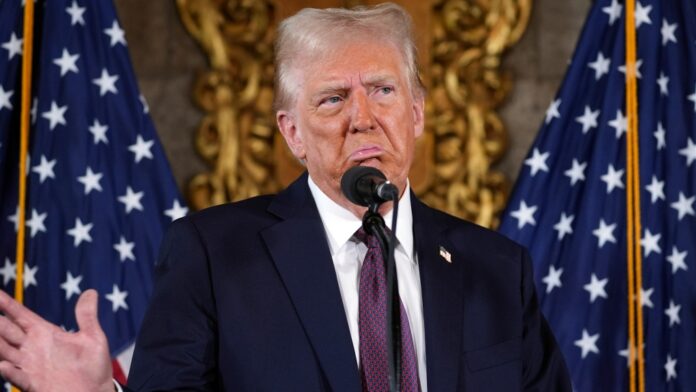Talk of Canada becoming the 51st American state has raised an existential question on this side of the border: Could it be done? Could the maple leaf make way to the stars and stripes? According to several experts, it may be possible, but not painless.
“If the Americans wanted to conquer us militarily, I guess so. Otherwise, not really and certainly not in the amount of time the president-elect thinks it would take for this to happen,” says Adam Chapnick, professor of defence studies at the Canadian Forces College in Ontario.
There are several roadblocks that would slow, or stop, the dismantling of the longest undefended border in the world, among them, lengthy constitutional processes on both sides.
What needs to happen?
If U.S. president-elect Donald Trump’s plan to use economic might to coerce Canada into joining the U.S. came to pass, Canada would need to essentially disband. That, experts say, would require invoking a constitutional amendment that would require the agreement of the House of Commons, the Senate, and of every province.
“And even with all that, then you have Indigenous Nations. Even if they are implicated in disbanding this union, there is no guarantee they would want to join the United States,” says Chapnick.
Additionally, South of the border, the processes could be fraught with peril. The annexation would trigger votes in both the Congress and Senate.
“I don’t think that most Republicans would want Canada to become the 51st state. Based on our forty million population, we would get approximately the same number of seats as California. It is possible that many of those seats could go to Democrats,” says Chapnick.
Roadblocks
Frederic Berard, a lawyer and a professor at Universite de Montreal, says there are many reasons Americans may want to bring Canada into the fold — including its resources, like water and electricity — and that it is likely impossible that Canada would reach unanimity and vote to join the U.S.
If Trump decides to move in militarily, he says Canada will need to look at international laws, but that its options could be limited. The U.S. is a permanent member of the UN Security Council and has not signed on to recognize the war crimes tribunal.
“It would probably be a matter of diplomacy,” says Berard. “Can we think that we could plead our case to Europe, so that they could lend a hand? Or the G7?”
Chapnick says that it would be “absurd” for the Americans to resort to military action against a trusted ally, with whom it shares intelligence.
“It is not even something we plan for, it is so silly for anyone to contemplate to do that, and Trump, to his credit, has said he would not use actual force.”
Negotiation tactic
Some other experts also believe it is a negotiation tactic, and that Trump knows invoking the issue would spark a reaction that he hopes could tear at the fabric of Canada.
“Canada must not panic right now,” says veteran political analyst John Parisella, author of books and articles on American politics. “The council of the federation has to get together, we have to find common ground and decide what is in our best interest as Canadians, and not focus too much on issues designed to push buttons.”

